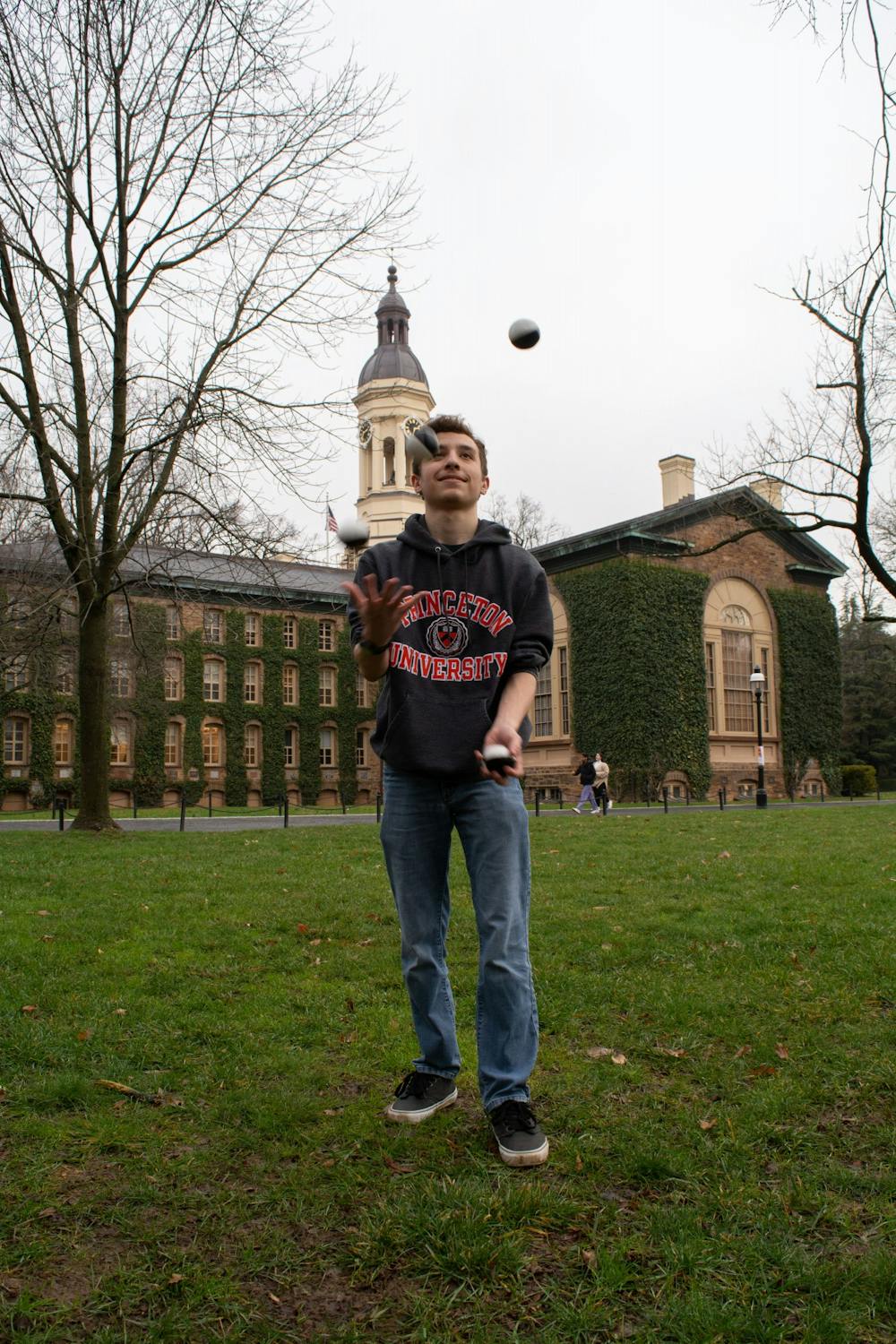No dues, no auditions, no requirements, but lots of fun: The Princeton Juggling Club (PJC)‘s website is emblazoned with the motto: “Juggling in the Nation’s Service.”
From her 11 years with the PJC, Skye Jerpbak ’16, a Campus Chaplain for Princeton Christian Fellowship, has been able to watch the club grow firsthand. Last semester alone, the club performed in about ten different shows. “There’s just greater awareness on campus. That didn’t happen so much when I was an undergrad,” Jerpbak explained.
Just as the club’s campus profile has grown, so has the club itself. The PJC is a tight-knit community consisting of about twenty members, with just as many undergraduate as graduate jugglers.
Club members came to juggling in different ways.
For instance, Jerpbak learned to juggle with her mother and sister after watching an elementary school juggling performance. But Kerstin Fagerstrom ’24, the president of PJC, started not as a juggler, but as a unicyclist.
“I was in a circus club about ten years ago and I learned how to unicycle. I rode by [the PJC] and they were like, ‘You’re weird, you should be in the club.’ So I performed with them that night, and I felt silly because I couldn't juggle in the juggling club, so I learned to juggle,” Fagerstrom said.
The club treasurer Nicholas Urbati ’25 decided to learn how to juggle after his high school physics professor offered extra credit for those who learned.
Jerpbak, Fagerstrom, Urbati, and other club members combine their various juggling backgrounds to put on performances almost every other week.

Logan Pearce, a third-year graduate student in the Psychology Department and the club’s artistic director, is responsible for much of the artistry behind the performances. According to Pearce, they need only two practices to create a performance.
“We know a lot of the tricks, and it’s just about putting them together, but we also try to do at least one new thing for each performance,” Pearce said.
The uniqueness of each piece makes their rehearsals all the more enjoyable. “It ends up just being a lot of spitballing. It could just be like, someone says a funny thing, and we’re like ‘Hey, that could actually end up working.’ If we get above a 70% accuracy with it, that can make it into the show,” said Urbati.
“First, we pick an upbeat song. Usually something pop. Then I look at the people who are performing, and think about what tricks everyone knows,” Pearce said.

As the performance progresses, jugglers perform more complex tricks. Jerpbak particularly enjoys club passing, which involves juggling clubs with partners to create a pattern.
For Jerpbak, juggling is more than just tricks, it’s storytelling. “When we’re doing our annual show, we’re trying to tell some type of story — what patterns look cool visually, what patterns are fun to do, what might go in line with the music. We want to present it in a way that’s fun to watch,” she explained.
Once the tricks are practiced and the story is written, the Princeton Juggling Club takes to the stage.
But sometimes performing presents its challenges. “When you’re nervous, your hands are shaking, and when you see the crowd it’s a lot of people,” Pearce explained. “The first time I performed was Tiger Night 2021,“ referencing a showcase of University performing arts groups for first-year students. “The volume of the crowd was very shocking in the beginning,” she continued.
Messing up is inevitable, however. “We know we’re going to mess up. Sometimes at the beginning of the show, we’ll make a joke about it, like, ‘Hey, when you see something you like, clap. When you see us drop, clap even more.’ It’s not very serious—it’s much more comedic, much more fun,” Jerpbak said.
For their 2022 performance “Romeo and Juggliette,“ the club had members juggling toilet paper. “As long as we’re making people laugh, I think we’re doing a good job, even if we mess up,” Urbati said.
Comedy and silliness aside, juggling is also about forming friendships and building an inclusive community for the club members. “Our practices technically end at three, but we end up staying most of the time almost an hour after, just chatting and having fun,” said Urbati.
According to Jerpbak, learning how to juggle is just as easy as joining the club. “People think that they can’t juggle, but given just a little bit of practice, anyone can pretty much juggle. You can learn to juggle in twenty or thirty minutes and be able to get it going,” Jerpbak said.
Through juggling, club members can form friendships, have fun, and also just relax. “[Juggling is] really de-stressing,” Fagerstrom said. “Genuinely. I learned to juggle by taking breaks between my homework and going back and forth. It’s a really nice break for your brain,” she added.
The Princeton Juggling Club provides a fun, relaxing, and open environment to explore the creativity behind juggling and bring humor to the campus community — their website reads “Juggling in the Nation’s Service.”
“Every time I leave juggling, my mood is always better,” Jerpak said. “Come just step in the door and you won’t regret it.”
Sam Yamashita is a Features staff writer for The Daily Princetonian. Please direct any correction requests to corrections[at]dailyprincetonian.com.








